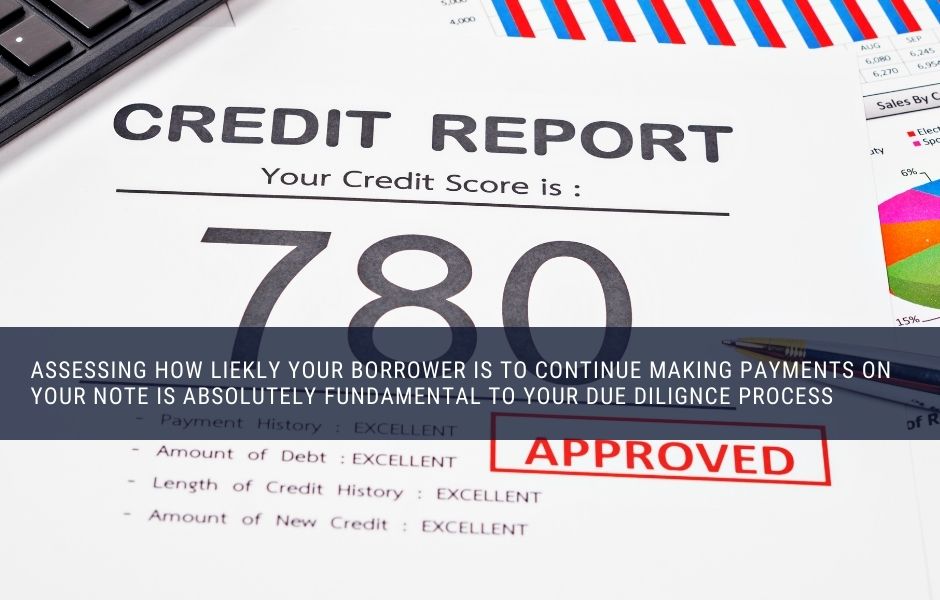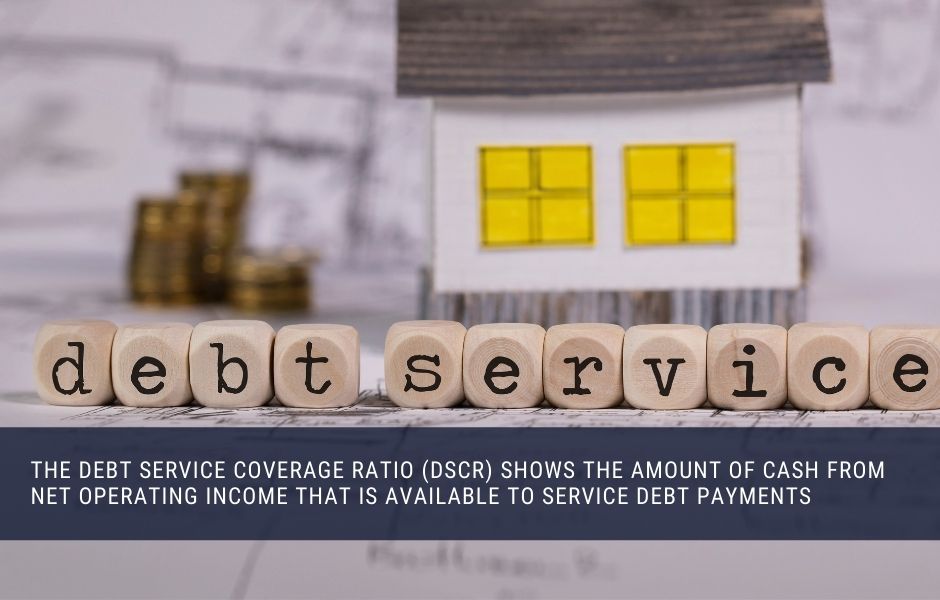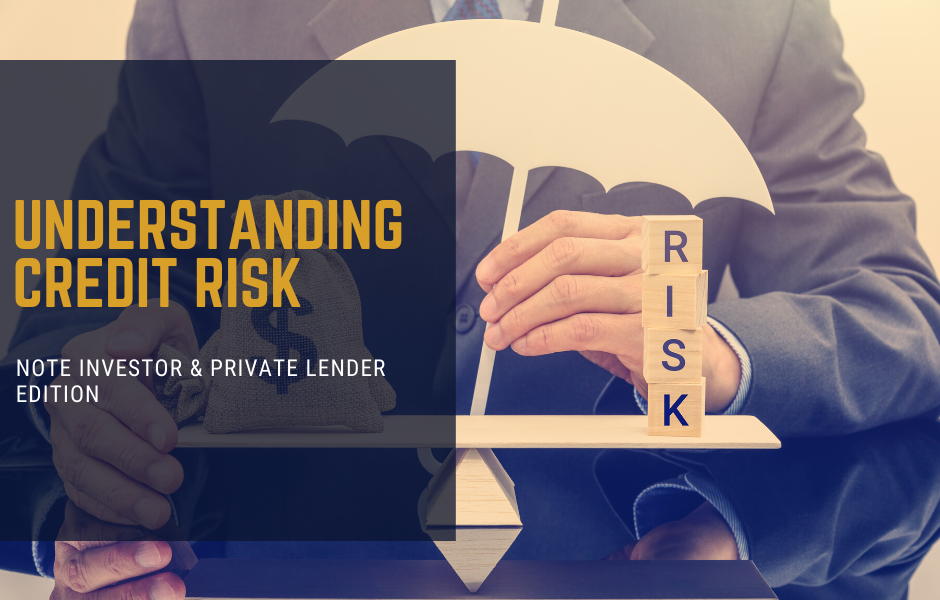A Guide to Credit Risk for Private Lenders and Mortgage Note Investors
Invest in Private Lending Safely: See fully-vetted Private Lending Investment Opportunities Every Thursday

David Garner
Understanding Credit Risk
Understanding credit risk is fundamental to making good private lending and note investing decisions. In this article, we look at the absolutely essential basics for assessing default risk.
Pro Tip: Get Details Of NEW Private Lending Investments In Your Inbox Every Thursday
What is Credit Risk?
Credit risk (aka counterparty risk) is the likelihood of a Borrower defaulting on a credit agreement.
In the case of private lending and note investing in real estate, the promissory note is the contract between borrower and lender, and a mortgage deed or deed of trust provides security from the loan.
A default usually becomes official when a Borrower is more than 90 days overdue on their payments. At this point the note becomes non-performing and loses a considerable amount of value.
Why is it so Important?
Having confidence in your Borrower is by far THE most important part of private lending.
Everything else flows from having a competent Borrower. They are choosing and assessing the real estate, putting together a plan for the property, rehabbing it and renting/selling/refinancing.
As the Lender, you simply sit back and collect your monthly check.

Properly assessing the risk associated with your Borrower – and their ability to perform – is one of the most difficult things to measure. After all, a person’s personal and general economic circumstances change all the time. What is true today may no longer be true tomorrow.
Communication, Capability, and Financial Stability
Above all else, you want a Borrower you can work with. Someone who communicates well, has a demonstrable track record, and is financially stable.
Once you have established that your potential Borrower is someone you are happy to work with, there are some basic checks and due diligence that will help you to identify credit risk.
Related: My 28-Point Private Lending Deal Assessment Checklist
How to Assess Credit Risk
In most cases when you are making a private money loan, your Borrower will be an individual, or an entity such as an LLC. The due diligence you gather will be slightly different in each case, but there is plenty of crossover.
Due Diligence for Individuals
If your Borrower is an individual, there are some absolutely key pieces of information you will require.
- Credit Score
- Annual Income
- Debt-to-Income Ratio
- Employment Status & History
- Background Check
Due Diligence for LLCs
Where your borrower is an an LLC or corporation, the information you need to see will be a little different.
- Credit Score of Majority Members
- Background Check of Majority Members
- Operating Agreement
- Articles of Association
- Balance Sheet
If your Borrower cannot – or will not – provide these basic items of Lender due diligence, move on. Sometimes the best lending decision is not to lend at all.
Private Lending for Rental Properties
Many real estate investors – including myself – use private money loans to acquire and rehab rental properties. In these cases, Lenders look at rental income as a means to service loan repayments. This is known as the Debt Service Coverage Ratio (DSCR).

In real estate, the DSCR is calculated as the Net Operating Income (NOI), divided by the debt payments.
DSCR Example
Let’s assume the projected NOI for a property is $500/month. The Borrower is asking for a $50,000 interest-only loan at 9% interest. The monthly interest payments on the loan are $375. The DSCR for that deal is 1.3 (500 divided by 375).
A DSCR of 1.2 is generally considered good by most Lenders. Anything higher is optimal, and anything less is considered more risky.
Remember, check that your Borrower has provided accurate rental projections and monthly expenses. The DSCR means nothing if the NOI is inaccurate.
Key Takeaways
You must buy into the seller (Borrower), not just the product (real estate & note). A deal can look great on paper, but everything can fall apart if your Borrower is inexperienced, incompetent, or worse, fraudulent. Do your due diligence. Make a checklist covering all the points of due diligence you need to collect.
Most importantly, make sure you are confident in the working relationship you establish with your Borrower. Experience, honesty, integrity, transparency and capability are rare traits in today’s World, but they are EXACTLY what you are looking for..
[/fusion_text]More Private lending and Note Investing Articles
- Where to Buy Mortgage Notes – A Complete List of Verified Sources
- Note Investing 101 – Everything you Need to Know About Note Investing
- Private Lending 101 – The Complete Investors Guide to Private Money Lending
- How to Invest in Notes – 7 Note Investing Strategies
- What is a Note and What Terms Should It Contain?
- Performing vs Non-Performing Notes – Which is the Better Investment?
- The Private Lender’s Guide to Assessing Credit Risk
- Understanding Lien Position and Priority
- How to Buy Mortgage Notes Online in 2021
- How to Assess Real Estate for note Investing and Private Lending
- Find Performing Notes for Sale in 2021
- Private Lending 101 – Everything you Need to Know About Private Money Lending
- Is Buying Mortgage Notes a Good Investment in 2021?
- Note Investing vs Rental Properties – Which is the Best Investment?
- Performing Notes – What Why and How to Buy
- Is Real Estate Note Investing Risky?
- Real Estate Notes vs REITs – Which is the Better Investment?
- The 3 Best Real Estate Investing Opportunities in 2021
- What is the Difference Between a Note and a Mortgage?
- Real Estate Notes – Everything You Need to Know
- My Top 5 Real Estate Note Investing Tools and Resources
- 3 Note Investing Funds for Passive Investors
- Using Note Investing to Boost Your Monthly Income
- Non Performing Notes – Everything You Need to Know


